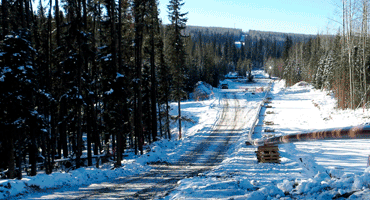Carbon+Intel: Pembina Pipeline Looks to Work with Rival Canada Carbon Capture Plans
WINNIPEG, Manitoba (Reuters) — Canada's Pembina Pipeline Corp. is asking backers of two competing proposals for carbon capture hubs in the oil-producing province of Alberta to combine efforts with its own plan, the company's chief executive said on Tuesday.

Pembina and TC Energy Corp said in June they were looking to develop a system to transport and sequester carbon. The Alberta government, which controls underground space for burying carbon, called for expressions of interest this autumn.
Carbon capture facilities are expected to be a key part of global efforts to contain emissions from fossil fuel production. Canada is the world's fourth-largest oil producer and aims to cut national greenhouse gas emissions by at least 40% by 2030.
The Pembina-TC plan, called Alberta Carbon Grid, faces competition from at least two others - Oil Sands Pathways, pitched by the largest oil sands producers, and Polaris, a proposal by Royal Dutch Shell.
Pembina has spoken with both groups about joining together and talks remain active, CEO Mick Dilger told Reuters.
"A single, large carbon capture program at scale is by far the most sensible way to do things," Dilger said. "If everybody works together, we'll come up with a more cost-effective solution."
Whether such cooperation happens remains to be seen, Dilger said.
Pembina and TC would need to convince Shell and the Pathways partnership of Canadian Natural Resources, Cenovus Energy, Imperial Oil, Suncor Energy and MEG Energy, of a change in concept, he said.
Pembina and TC proposed a plan that would make use of spare pipelines that they own to reduce costs. The other proposals rely more on new infrastructure, Dilger said.
There is also the unknown of how Alberta will allocate space for sequestering carbon, Dilger said, adding that the provincial government is "reassessing how that might be done."
The rival companies and the Alberta government could not be reached for comment.
Pembina and TC have picked a reservoir at Fort Saskatchewan, an industrial hub near Edmonton, and not far from where Shell proposes its own carbon sequestration site. Pathways proposes a storage hub at Cold Lake in the oil sands.
Pembina and TC say their plan's first phase could operate by 2025.
"Normally we like to do things on our own because they're simpler," Dilger said. "But carbon capture is something that the sector can and should do cooperatively, with government. We would love to come together."
Related News
Related News

- Keystone Oil Pipeline Resumes Operations After Temporary Shutdown
- Freeport LNG Plant Runs Near Zero Consumption for Fifth Day
- Biden Administration Buys Oil for Emergency Reserve Above Target Price
- Mexico Seizes Air Liquide's Hydrogen Plant at Pemex Refinery
- Enbridge to Invest $500 Million in Pipeline Assets, Including Expansion of 850-Mile Gray Oak Pipeline




Comments